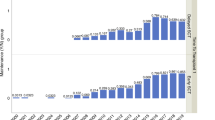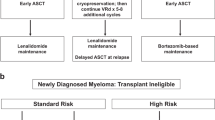Summary:
Clinical outcomes were evaluated in 89 consecutive patients with multiple myeloma that had not responded to dexamethasone-based primary therapy, who received early intensive therapy supported by autologous stem cell transplantation. Results were compared with those of 45 comparable patients who refused or were unable to receive intensive treatment for socioeconomic reasons. Following high-dose therapy, the response rate was 69% including 16% with CR. Survival of 14 patients with CR (median >7.0 years) was significantly longer than those of 47 patients with PR (median 4.5 years) or of 28 patients who remained NR (median 2.2 years). CR occurred in 43% of patients with serum myeloma protein <1.5 gm/dl, in contrast to 7% of those with higher values, a finding similar to that observed previously for patients consolidated in PR. No prognostic factor was associated with PR and, in view of the high frequencies of PR or CR, all patients with primary resistant myeloma should be considered for early intensive therapy. The limited improvement of lifespan and disease-free survival for those in PR indicated the need for further treatment to achieve CR, the major surrogate marker for long survival.
This is a preview of subscription content, access via your institution
Access options
Subscribe to this journal
Receive 12 print issues and online access
$259.00 per year
only $21.58 per issue
Buy this article
- Purchase on Springer Link
- Instant access to full article PDF
Prices may be subject to local taxes which are calculated during checkout



Similar content being viewed by others
References
Barlogie B, Alexanian R, Dicke K et al. High dose chemoradiotherapy and autologous bone marrow transplantation for resistant multiple myeloma. Blood 1987; 70: 868–872.
Cunningham D, Pazares L, Gore M et al. High-dose melphalan and autologous bone marrow transplantation as consolidation in previously untreated multiple myeloma. J Clin Oncol 1994; 12: 759–763.
Alexanian R, Dimopoulos M, Hester J et al. Early myeloablative therapy for multiple myeloma. Blood 1994; 84: 4278–4282.
Attal M, Harosseau J, Stoppa J et al. Autologous bone marrow transplantation versus conventional chemotherapy in multiple myeloma. N Engl J Med 1996; 335: 91–97.
Bensinger W, Rowley S, Demirer T et al. High-dose therapy followed by autologous hematopoietic stem-cell infusion for patients with multiple myeloma. J Clin Oncol 1996; 14: 1447–1456.
Barlogie B, Jagannath S, Vesole D et al. Superiority of tandem autologous transplantation over standard therapy for previously untreated multiple myeloma. Blood 1997; 89: 789–793.
Child J, Morgan G, Davies F et al. High-dose chemotherapy with hematopoietic stem-cell rescue for multiple myeloma. N Engl J Med 2003; 348: 1875–1883.
Tricot G, Barlogie B, Jagannath S et al. Poor prognosis in multiple myeloma is associated only with partial or complete deletions of chromosomes 13 and not with other karyotype abnormalities. Blood 1995; 86: 4250–4256.
Blade J, San Miguel J, Fontanillas M et al. Survival of multiple myeloma patients who are potential candidates for early high-dose therapy intensification/autotransplantation who were conventionally treated. J Clin Oncol 1996; 14: 2167–2173.
Lahuerta J, Martinez-Lopez J, de la Serna J et al. Remission status defined by immunofixation vs electrophoresis after autologous transplantation has a major impact on the outcome of multiple myeloma patients. Br J Haematol 2000; 109: 438–446.
Alexanian R, Weber D, Giralt S et al. Impact of complete remission with intensive therapy in patients with responsive multiple myeloma. Bone Marrow Transplant 2001; 27: 1037–1043.
Alexanian R, Barlogie B, Tucker S . VAD-based regimens as primary treatment for multiple myeloma. Am J Hematol 1990; 33: 86–89.
Alexanian R, Dimopoulos M, Delasalle K, Barlogie B . Primary dexamethasone treatment of multiple myeloma. Blood 1992; 80: 887–890.
Weber D, Dimopoulos M, Gavino M et al. Thalidomide alone or with dexamethasone for previously untreated multiple myeloma. J Clin Oncol 2003; 21: 16–19.
Dimopoulos M, Alexanian R, Przepiorka et al. A new preparative regimen for autologous marrow or blood stem cell transplantation in high-risk multiple myeloma. Blood 1993; 82: 2324–2328.
Giralt S, Bensinger W, Goodman M et al. 166Ho-DOTMP plus melphalan followed by peripheral blood stem cell transplantation in patients with multiple myeloma. Blood 2003; 102: 2684–2691.
McLaughlin P, Alexanian R . Myeloma protein kinetics following chemotherapy. Blood 1982; 60: 851–955.
Vose J, Anderson J, Kessinger A et al. High-dose chemotherapy and autologous hematopoetic stem-cell transplantation for aggressive non-Hodgkin's lymphoma. J Clin Oncol 1993; 11: 1846–1851.
Rajkumar S, Fonseca R, Lacy M et al. Autologous stem cell transplantation for relapsed and primary refractory myeloma. Bone Marrow Transplant 1999; 23: 1267–1272.
Vesole D, Crowley J, Catchatourian R et al. High-dose melphalan with autotransplantation for refractory multiple myeloma: results of a Southwest Oncology Group phase II trial. J Clin Oncol 1999; 17: 2173–2179.
Singhal S, Powles R, Sirohi B et al. Response to induction chemotherapy is not essential to obtain survival benefit from high-dose melphalan and autotransplantation in myeloma. Bone Marrow Transplant 2002; 30: 673–679.
Bensinger W, Maloney D, Sandmaier B et al. Non-myeloablative allogeneic transplant strategies for the treatment of multiple myeloma. Hematol J 2003; 4 (Suppl. 1): S68 (abstract).
Richardson P, Barlogie B, Berenson J et al. A phase 2 study of bortezomid in relapsed refractory myeloma. N Engl J Med 2003; 348: 2609–2617.
Acknowledgements
We thank Rose Guevara for careful preparation of the manuscript. This work was supported by Lucille Murchison and Kay Laro research funds.
Author information
Authors and Affiliations
Corresponding author
Rights and permissions
About this article
Cite this article
Alexanian, R., Weber, D., Delasalle, K. et al. Clinical outcomes with intensive therapy for patients with primary resistant multiple myeloma. Bone Marrow Transplant 34, 229–234 (2004). https://doi.org/10.1038/sj.bmt.1704562
Received:
Accepted:
Published:
Issue Date:
DOI: https://doi.org/10.1038/sj.bmt.1704562
Keywords
This article is cited by
-
Impact of Pre-transplant and Post-transplant Remission Status of Patients on Survival in Newly Diagnosed Multiple Myeloma
Indian Journal of Hematology and Blood Transfusion (2019)
-
Utilization of hematopoietic stem cell transplantation for the treatment of multiple myeloma: a Mayo Stratification of Myeloma and Risk-Adapted Therapy (mSMART) consensus statement
Bone Marrow Transplantation (2019)
-
Pattern of relapse and progression after autologous SCT as upfront treatment for multiple myeloma
Bone Marrow Transplantation (2014)
-
Value of novel agents and intensive therapy for patients with multiple myeloma
Bone Marrow Transplantation (2014)
-
CR represents an early index of potential long survival in multiple myeloma
Bone Marrow Transplantation (2010)



